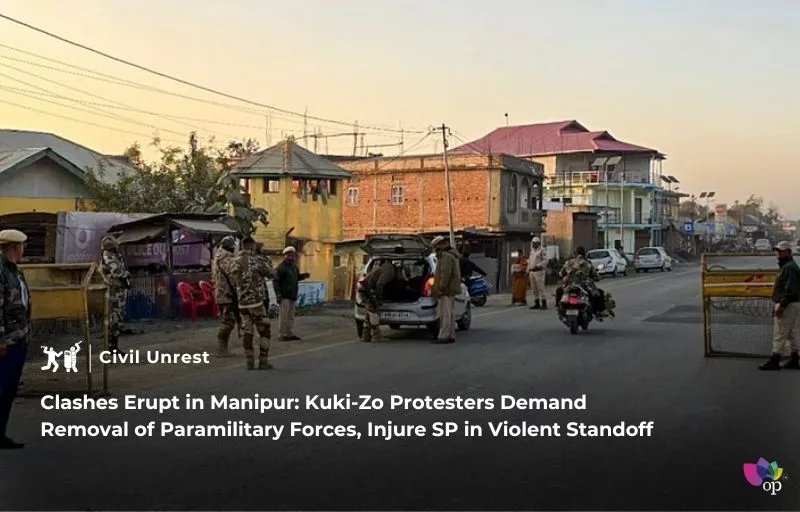Overview
Manipur’s Kangpokpi district witnessed heightened tensions on Friday evening as protests organized by Kuki-Zo communities escalated into violent clashes. The unrest, fueled by grievances over the deployment of Central paramilitary forces in the region, resulted in injuries to several police personnel, including the Superintendent of Police (SP), Manoj Prabhakar. The demonstration was sparked by the alleged use of force by paramilitary personnel against tribal women protesters on December 31, which has deepened the ongoing conflict in the region.
Sequence of Events
The demonstration, led by the Committee on Tribal Unity (CoTU), began as a rally demanding the removal of forces like the CRPF and BSF from the Saibol area. Protesters alleged that these forces had acted against the interests of the tribal population, particularly in operations targeting armed Kuki groups.
The situation took a volatile turn when demonstrators attempted to lock the SP’s office, accusing the police leadership of failing to meet their demands. The protest quickly descended into chaos as stones and petrol bombs were hurled at the police station. Security personnel responded with baton charges and tear gas, ultimately dispersing the crowd but sustaining injuries in the process.
Damages to property, including vehicles parked at the police premises, have been reported, and additional security forces have been deployed to stabilize the situation.
Underlying Issues
The unrest is rooted in longstanding ethnic tensions between the Kuki and Meitei communities, which have been exacerbated by recent clashes. The Kuki-Zo protesters have expressed strong opposition to the presence of CRPF and BSF, advocating instead for the deployment of the Army and Assam Rifles, whom they view as more impartial.
Central forces have conducted operations in Kangpokpi in recent weeks to dismantle fortified positions, or “bunkers,” allegedly used by armed Kuki groups. These groups are accused of targeting Meitei communities in neighboring districts, a claim that has intensified demands for stricter security measures.
Military and Government Response
Senior Army officers, including Lt. Gen. Abhijit S. Pendharkar, met with Governor Ajay Kumar Bhalla to assess the volatile security situation. The officials discussed troop deployment strategies, particularly in sensitive border regions. Lt. Gen. Pendharkar also visited Assam Rifles personnel stationed in the Noney district, commending their efforts and emphasizing preparedness.
The police issued a statement late Friday night confirming the injuries sustained by the SP and others. They assured the public that the situation was under control and being monitored closely.
Analysis
The protests reflect a broader dissatisfaction among the tribal communities over perceived partiality and heavy-handedness of the security forces. The demand for exclusive deployment of the Army and Assam Rifles highlights the mistrust of paramilitary units, possibly stemming from past incidents of alleged excesses.
The ongoing Kuki-Meitei conflict has claimed over 250 lives and displaced more than 60,000 people since May 2023. Despite the presence of substantial security forces, sporadic violence continues, revealing the deep ethnic fault lines that administrative measures alone have failed to address.
The violent turn of Friday’s protest could further strain relations between the Kuki-Zo communities and state authorities, with threats of economic blockades adding to the region’s instability. The ultimatum issued by tribal organizations suggests a willingness to escalate the conflict if demands are not met, putting pressure on both state and Central governments to negotiate a resolution.
Recommendations for Resolution
Engagement with Community Leaders: Dialogue with organizations like CoTU is essential to address their concerns and rebuild trust.
Independent Oversight: Deploy impartial observers or mediators to monitor operations conducted by Central forces and ensure accountability.
Address Grievances: Investigate the allegations of excessive force during the December 31 protest and take appropriate actions to restore faith in the security apparatus.
Ethnic Reconciliation Efforts: Promote initiatives that encourage collaboration and understanding between the Kuki and Meitei communities to mitigate ethnic tensions.
Conclusion
The incident in Kangpokpi is a stark reminder of the fragile peace in Manipur. Without a balanced and inclusive approach to security and governance, such confrontations risk perpetuating the cycle of violence. The state must urgently prioritize dialogue and reconciliation to pave the way for long-term stability in the region.
References



Comments 1